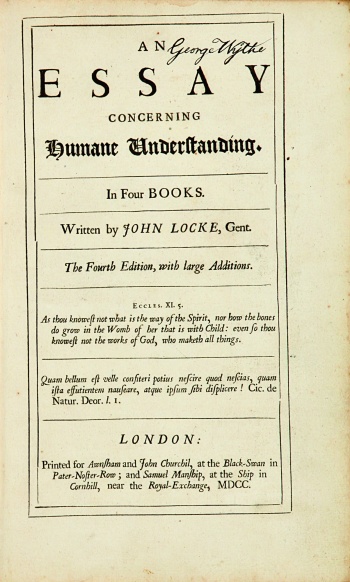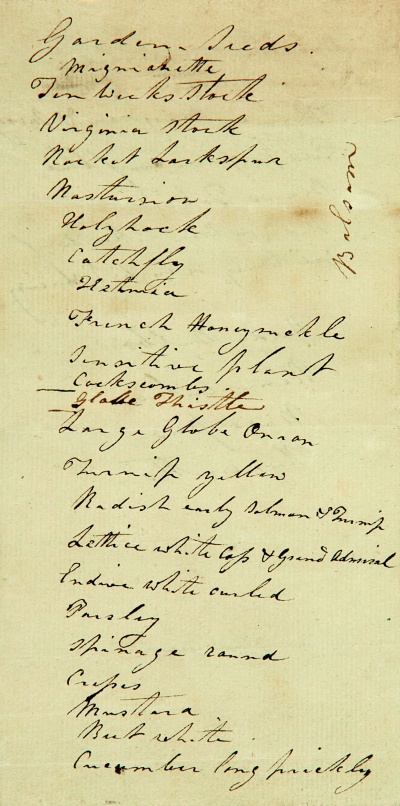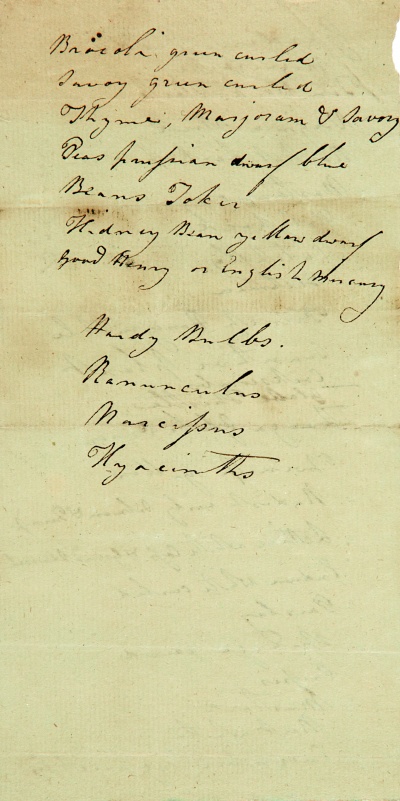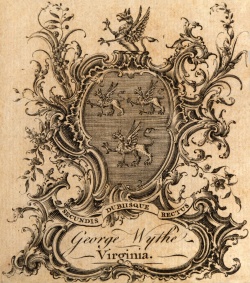Difference between revisions of "Essay Concerning Humane Understanding"
(→Evidence for Inclusion in Wythe's Library) |
|||
| Line 67: | Line 67: | ||
[[wikipedia:Reseda (plant)|Mignianette]] | [[wikipedia:Reseda (plant)|Mignianette]] | ||
| − | [[wikipedia:Matthiola| | + | Ten Weeks [[wikipedia:Matthiola|Stock]] |
| − | Virginia Stock | + | Virginia [[wikipedia:Matthiola|Stock]] |
[[wikipedia:Consolida|Rocket Larkspur]] | [[wikipedia:Consolida|Rocket Larkspur]] | ||
Revision as of 16:25, 16 September 2015
by John Locke
| An Essay Concerning Humane Understanding | ||
|
at the College of William & Mary. |
||
| Author | John Locke | |
| Published | London: Printed for Awnsham and John Churchil ... and Samuel Manship | |
| Date | 1700 | |
| Edition | Fourth | |
| Language | English | |
| Pages | [38], 438 (i. e. 432), [12] | |
| Desc. | Folio (33 cm.) | |
John Locke was born on the 29th of August, 1632 in Somerset, England, to John and Agnes Locke.[1]
Born into a family of means but minor status, Locke spent his early childhood in Pensford, a village south of Bristol. His father was an attorney, and steward to the Pophams, a powerful local family. The elder John Locke curried favor with Alexander Popham through serving as a captain in Popham's regiment of the parliamentarian army during the English Civil War. After the conclusion of hostilities, Popham recommended the younger John to the Westminster School, a highly prestigious institution, in return for his father’s loyal service.
Locke entered the school in 1647, and was made a King’s Scholar in 1650, studying alongside the likes of John Dryden, Robert Hooke, and Christopher Wren. 2 years later, he was elected to a studentship at Christ Church, Oxford.

Locke was a man of varied interests, and well-versed in a number of subjects. His early education focused on the ancient languages, including Latin, Greek, and Hebrew. Earning a Bachelor's and Masters of Arts by 1658, he also dabbled in poetry, theology, and natural philosophy while attempting to decide on a career path. He also studied medicine with something more than a casual interest, but not rising to the level of formal study. He held several teaching positions at Christ's Church: he was named praelector in Greek and rhetoric, and later named censor of moral philosophy. Later, he would tutor several students, none of them of note.
After his term of censor ended, he held no more positions for a time, then only irregularly after that. His position within the college was precarious, as he had taken no holy orders, a requisite for high title absent royal dispensation. While Locke had procured as much, it was revocable at any time and thus not a source of much comfort. This uncertainty was swept away after he returned to Christ's Church in 1675 and took a Bachelor’s of medicine, allowing him to occupy a medical studentship at the college, which could be held by laypeople.
Aside from tutoring irregularly, Locke did not accomplish much else of note within the halls of academia.
Locke, after the conclusion of his term as censor in 1665, accompanied a diplomatic mission to Cleves. The purpose of the mission was to allow Sir Walter Vane to negotiate with the Elector of Brandenburg, Frederick William (known as the 'Great Elector'). Although the mission yielded little in the way of productive diplomacy, all accounts indicate that Locke, appointed secretary during the mission, greatly enjoyed his time abroad.
After securing his medical studentship at Christ's Church in 1675, Locke embarked upon a three-year trip to France, motivated by failing health, and perhaps in part by the attribution of authorship of an anonymous pamphlet critical of a royal minister. During his travels, he began the practice of keeping a journal, documenting his day-to-day life. The journal’s tone does not rise to the level of intimate; however, it is not accurately described as clinical, either.
Locke arrived in his initial destination, Montpellier, arriving in the port of Calais and subsequently traveling through Paris and Lyon. Though conversant in French, Locke could not read the language. To rectify this, he hired a tutor to teach him to read in French once ensconced at Montpellier. His newly earned ability to read French opened up a world of philosophical debate, as many French philosophers wrote in the vernacular rather than Latin. During this time, Locke completed two manuscripts intended for private circulation, and assisted in the composition of a folio, titled "Essay de Intellectu".
Two years later, Locke agreed to tutor a Caleb Banks, the son of Sir John Banks, in Paris. He traveled to the city through Toulouse and Bordeaux, and aside from an autumn trip through provincial France in 1678, tutored the boy regularly until the two returned to England in 1679.
In 1683, a number of Locke's acquaintances plotted to assassinate the Catholic monarch, and Locke found himself in an unstable position. After getting his affairs in order, he arrived in Rotterdam late in the year, beginning his exile.
While fleeing to Rotterdam, Locke left behind a number of papers which indicate, in retrospect, that self-imposed exile was probably in his best interests. The writings attack pro-monarchist treatises such as Filmer's Patriarcha and Hobbes' Leviathan. In his attacks, Locke insisted that absolute authority could not be held by a monarch, and advocated for the right of resistance against any would-be wielder of absolute power.
Once in Rotterdam, Locke traveled immediately to Amsterdam. There, he read a number of works on medicine and gained previously-absent practical experience in the field by shadowing local luminaries, and, on one occasion, attending the autopsy of a lioness that had succumbed to a harsh winter.
In addition to expanding his knowledge of contemporary medicine, Locke observed and was impressed by the Netherlands' policy of religious toleration. Instead of doctrinal differences leading to upheaval as in England, the Netherlands enjoyed a period of relative peace despite religious differences in its citizenry. This would prove to solidify Locke’s already-strong support for toleration in England. During this time, Locke also continued work on his Essay Concerning Human Understanding, producing a version of it that was nearly identical to the officially published version while still in Amsterdam.

While Locke flourished intellectually in Amsterdam, the foundation that he had built for himself back in England was crumbling due to his self-imposed exile. Due to his familiarity with a number of fellow political exiles in the Netherlands, and the Crown’s suspicion that he was responsible for authoring a number of libelous pamphlets, Locke was expelled from the studentship at Christ’s Church that he had so desperately sought to obtain. Furthermore, due to his alleged association with the Duke of Monmouth's failed coup attempt, the Crown attempted to have him arrested in Amsterdam. Locke again was forced into hiding.
Locke, on the heels of the Glorious Revolution, returned to England in 1689. The next year, he published the Essay Concerning Human Understanding. From 1690 until 1700, he served in a number of civil service positions at the pleasure of the new king, William of Orange, or William III, after his coronation. These positions dealt with matters of economic import, including a stint on the Board of Trade. Finally, in 1700, his health was too weak to allow him to continue work, and he retired to the English countryside near Oates. While he refined some existing works, he did not publish anything novel during this time. On October 28th, 1704, he died sitting in his study.
Evidence for Inclusion in Wythe's Library
George Wythe's copy of this book has survived, and is currently in a private collection. The title page boasts a clear, steady version of Wythe's signature in the top right corner.
Found inserted between the pages of the book was a list of "Garden Seeds" and "Hardy Bulbs" in Wythe's handwriting, presumably intended for filling the ample gardens of his residence in Williamsburg or his house in Richmond, Virginia.
|
 A list of seeds and bulbs (front) found in George Wythe's personal copy of An Essay Concerning Humane Understanding. Wythe's copy is in a private collection. |
|
 A list of seeds and bulbs (back) found in George Wythe's personal copy of An Essay Concerning Humane Understanding. Wythe's copy is in a private collection. |
See also
References
- ↑ J. R. Milton, 'Locke, John (1632–1704)', in Oxford Dictionary of National Biography, accessed 30 April 2015.
External links
- Read this book in Google Books.
